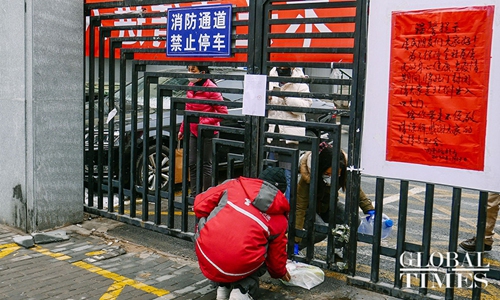HOME >> SOURCE
Caixin services PMI plunges to record low of 26.5 in February
By Song Lin and Li Xuanmin Source:Global Times Published: 2020/3/4 18:38:47

Deliveryman passes a package to a resident through locked gate in Beijing on February 5. Photo: Li Hao/GT
China's Caixin/Markit services Purchasing Managers' Index (PMI) in February plunged to 26.5 from 51.8 in January amid the coronavirus outbreak, the first time that the reading was below the 50 beak-even point that separates expansion from contraction since the survey started in 2005.From financial consultancies to travel platforms, all noted that the past month has been a tough time.
"We had zero new orders for the past month," Monica Bai, an employee of a financial consultancy in Shenzhen, South China's Guangdong Province, told the Global Times on Wednesday.
Meanwhile in Beijing, a high-end travel agency named 6renyou arranged refunds for customers who were scheduled to travel during the Spring Festival. Jia Jianqiang, the company's CEO, told the Global Times that there was generally no business in February, and the whole tourism sector was pummeled.
The Caixin survey focuses on small and medium-sized private companies, and the record decline underscores the lingering uncertainties among China's private services industry that is staggering under the immense impact of the coronavirus.
The sharp drop was actually within estimations, given that nearly all provinces and regions in China had adopted the highest level of prevention measures since the outbreak and industries across the nation have been actively cooperating to try to reduce direct contact among people, Zhao Jingqiao, director of the Service Economy and Catering Industry Research Center under the Chinese Academy of Social Sciences, told the Global Times.
The slumping trend in the private services sector was in line with that of the manufacturing sector.
The Caixin manufacturing PMI also hit a record low of 40.3 in February, and China's official manufacturing PMI came in 35.7 in February, also the lowest in records.
According to documents released by the People's Court, a total of 249 Chinese companies went bankrupt from January 25 to February 21, when the coronavirus was at the height.
Most of those companies were small- and medium-sized enterprises in the retail, manufacturing and property industries. Among them, 55 were from South China's Guangdong Province, the country's manufacturing and export hub.
But industry observers expect a rebound in private services to come soon, as millions of Chinese consumers have been trapped at home for weeks and are eager to spend more, travel more, and eat more after the epidemic is under control.
Though the hit has been hard for the services sector, the services PMI figures would return to normal after April or May since the situation outside of the epicenter Hubei has eased and industries have been gradually resuming production, Zhao noted.
The demand still exists, which is the basis of a later recovery of the services sector, Zhao stressed.
6renyou rolled out new live-streaming broadcasting services during the period. Jia said that it would be a good chance for the company to expand its potential customer base.
Chinese policymakers have been introducing financial support for industries that were hard hit by the epidemic. More measures to spur consumption and release capital into the market are expected.
Posted in: ECONOMY